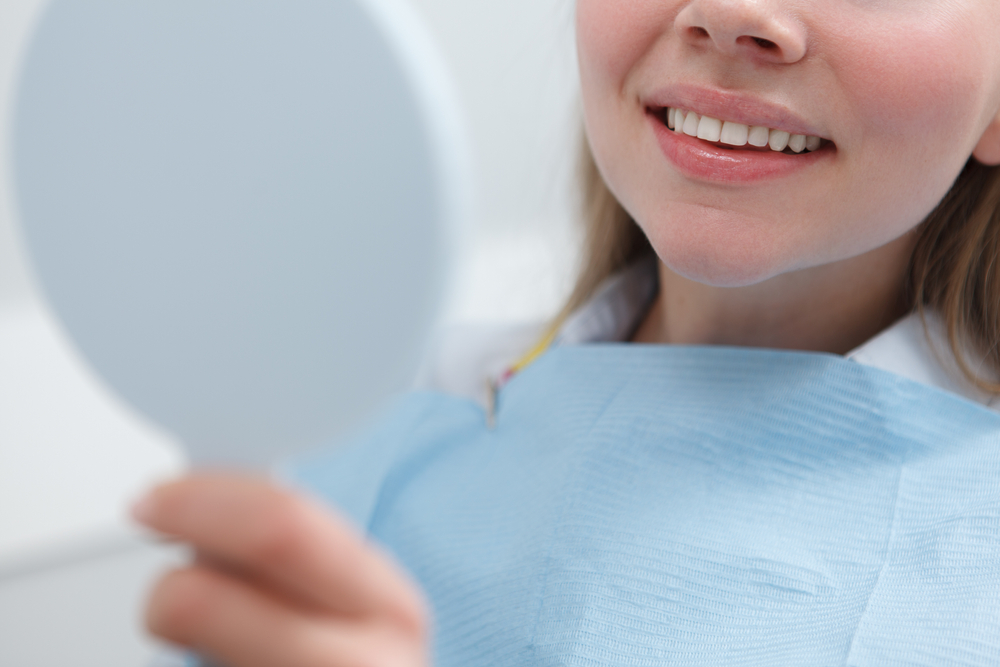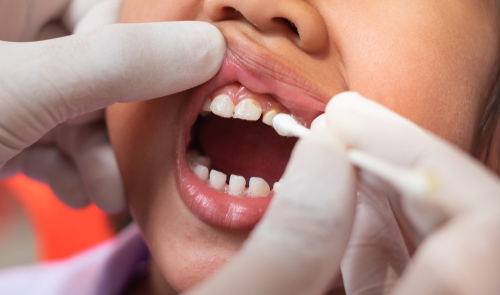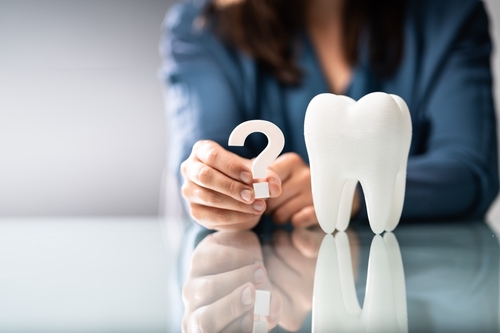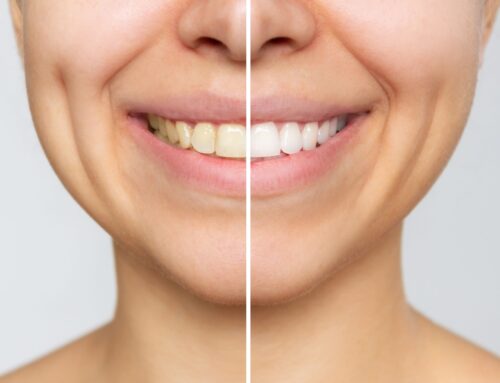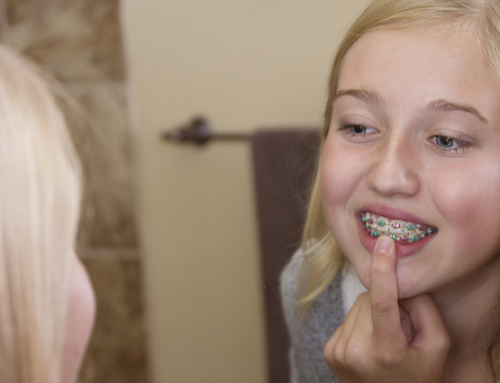The Dangers of Double Dipping Fluoride Treatments
Many people commonly think that more is better when it comes to dental care. More frequent brushing, flossing, and fluoride treatments. But did you know that most of the time, this isn’t really the case? All dental care is best done in moderation. For example, over-brushing can wear down your enamel and cause tooth sensitivity. Similarly to this, you can also get too much fluoride.
Keep reading to learn more about what happens when teeth are overexposed to fluoride.
What Is Fluoride?
You’ve probably heard of fluoride at your dentist’s office before. It’s a naturally occurring mineral most commonly known for its importance in maintaining healthy teeth. It can help strengthen teeth and prevent dental decay. Generally speaking, this mineral can often be found in water and certain foods. However, these days many people can get additional fluoride from toothpaste, supplements, or dental treatments.
Fluoride Treatment
If you take your child in to see the dentist regularly (or go yourself), you may eventually hear about fluoride treatments. Many dentists recommend fluoride treatment for patients that are prone to cavities or are simply not getting enough fluoride in their water.
Fluoride Treatment At Dentist
As we mentioned above, you can get fluoride treatments at a dentist’s office. These treatments function as a temporary boost, giving your teeth additional protection for a few months.
What To Expect
If you do decide to go ahead with a fluoride treatment, don’t worry, it’s not scary at all. In fact, it’s one of the quickest, easiest procedures you can get at your dentist’s office. Fluoride treatments are usually applied topically with a swab and paste, foam, mouthwash, or gel. The entire treatment takes less than an hour and doesn’t involve any needles or invasive procedures. Your dentist may instruct you to avoid eating or drinking for a while after to allow the fluoride to absorb better.
As an important note, however, you may want to ask whether or not your dental insurance covers fluoride treatments beforehand. Some insurance plans cover this treatment for children but not for adults.
Fluoride Treatment At Home
If you’re not able to get enough fluoride on a daily basis, your dentist might also recommend additional at-home treatment. This may come in the form of prescription medicine or an over-the-counter toothpaste or mouthwash.
It’s important to note, however, that you shouldn’t use fluoride supplements without talking to your dentist. Many people are able to get enough fluoride from their drinking water and don’t need any additional supplements. Additionally, overexposure to fluoride during early childhood years can lead to a condition called fluorosis.
What Does Too Much Fluoride Do?
Just like with any other minerals or vitamins, too much fluoride can result in negative side effects.
Fluorosis
A common dental condition, fluorosis, is the result of overexposure to fluoride during early childhood years. It can result in white specks or streaks on the teeth. Fortunately, most cases of fluorosis in the U.S. are mild and largely have no effect on tooth function. Having said that, the white spots can have a negative cosmetic impact on your appearance.
The important thing to know is that fluorosis forms during early childhood years when teeth are still forming underneath the gums. This means that the best way to prevent fluorosis is to moderate how much fluoride your child gets on a daily basis. Don’t supplement fluoride unless your pediatric dentist recommends it. Also, if your tap water has an unusually high amount of fluoride in it, you may want to mention that to your dentist. They may recommend an alternative source of water (such as bottled water).
If you or your child do have those telltale fluorosis spots, though, don’t worry. There are treatment options for fluorosis. For example, whitening, enamel microabrasion, and dental bonding are all commonly used procedures that can help with mild staining.
Yields No Benefit
A lot of the time, excess fluoride simply doesn’t do anything. Although this doesn’t really have any negative health effects, it can be a waste of money. So don’t forget to always consult with your dentist before taking any fluoride supplements or doubling down on fluoride treatments.
Also, remember that if you switch dental offices, they may need to know your or your child’s dental history. Try to keep track of any fluoride treatments your child receives so that you can convey this info to your new dentist.
Frequently Asked Questions
We hope that this article helped answer some of your questions regarding fluoride treatments. Just in case, however, here are a few last answers to commonly asked questions.
When Can I Eat After Fluoride Treatment?
After your fluoride treatment, make sure to ask your dentist how long you have to wait before you can eat or drink again. Oftentimes, you’ll have to wait about 30 minutes. The exact length of time does depend on what type of fluoride treatment was used. You may also be encouraged to stay away from hard, hot, or citrusy foods.
Try to opt for soft, lukewarm foods following a fluoride treatment. Think mashed potatoes, apple sauce, etc…
Is Fluoride Good For Your Teeth?
Generally speaking, a healthy amount of fluoride is good for your teeth. As you go throughout your day, your enamel naturally loses some minerals, leaving it vulnerable. This is where fluoride comes in. It remineralizes your enamel and makes your teeth more resistant to acids. This ultimately helps reduce your chances of developing tooth decay. Due to this, it’s important to get adequate amounts of fluoride.
Do keep in mind, though, that too much of a good thing can be harmful. If you think that you or your child may be consuming too much fluoride, make sure to mention it to your dentist, they may be able to offer some recommendations.
When Can I Brush My Teeth After Fluoride Treatment?
Similarly to food and drink, you may want to wait a while before brushing or flossing your teeth. This is in order to give the fluoride enough time to fully absorb. Make sure to ask your dentist how long you have to wait before leaving the dental office. Most of the time, this will just be four to six hours. Fortunately, dental visits are usually during the day, so you should have plenty of time before your nighttime dental routine. Don’t try to skip out on your dental routine just for the fluoride treatment, however. It’s better to call your dental office and ask instead.
Is Dentist Fluoride Treatment Necessary?
Many dentists recommend fluoride treatment for children once they have their first few teeth erupt. Children are particularly prone to cavities due to the fact that they have small teeth with lots of crevices and aren’t able to brush well yet. Fluoride can provide a little extra protection, strengthening the teeth and enamel. Adults can get fluoride treatment as well, but they don’t always require it.
Whether or not you need fluoride treatment largely depends on how prone you are to cavities and whether or not you’re getting enough fluoride as is. The best way to know for sure is to go in for your dental check-ups and cleanings. Your dentist will assess your dental health and recommend a fluoride treatment if it seems necessary.
Family Dentist
Are you looking for a new dental office that your whole family can visit? Look no further! Snodgrass-King Dental offers dental services for both adults and children. Our staff specializes in a variety of different dentistry, including pediatric dentistry and orthodontics. Feel free to check out our website and learn more about our staff and all of the services that we offer. Snodgrass-King Dental strives to be your one-stop-shop for dental care, including everything from check-ups, to braces, crowns, and implants.
If you’re worried about your or your child’s fluoride intake, simply schedule an appointment at one of our dental locations. Your dentist will be more than happy to answer any of your questions and recommend a course of treatment if necessary.
For insurance or location information, don’t forget to visit our website. We hope to see you soon!


